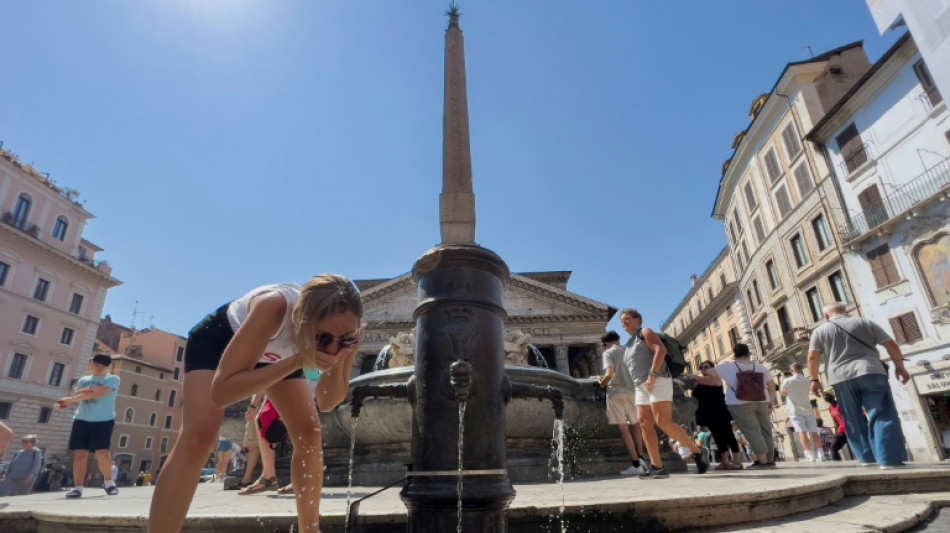
-
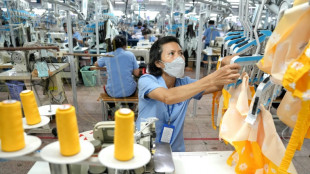 Trump tariffs spark fears for Asian jobs, exporting sectors
Trump tariffs spark fears for Asian jobs, exporting sectors
-
Stocks and dollar sink, havens rally as Trump tariffs fan trade war

-
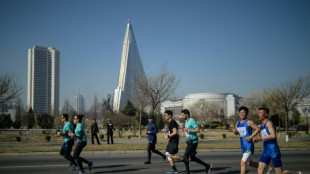 Runners fly to North Korea for first post-Covid Pyongyang Marathon
Runners fly to North Korea for first post-Covid Pyongyang Marathon
-
Hamilton rubbishes claims he's lost faith in Ferrari

-
 Nintendo Switch 2 sparks excitement despite high price
Nintendo Switch 2 sparks excitement despite high price
-
Sri Lanka's crackdown on dogs for India PM's visit sparks protest
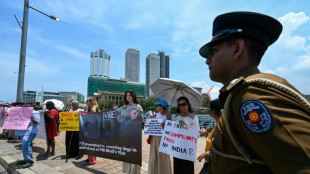
-
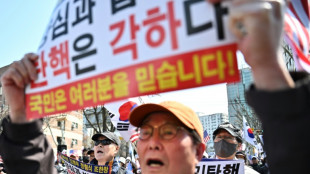 S Korea police raise security levels ahead of impeachment verdict
S Korea police raise security levels ahead of impeachment verdict
-
China vows 'countermeasures' to sweeping new US tariffs

-
 Trump jolts allies, foes and markets with tariff blitz
Trump jolts allies, foes and markets with tariff blitz
-
France says EU to target US online services after Trump tariffs

-
 Tsunoda vows to bring 'something different' after Red Bull promotion
Tsunoda vows to bring 'something different' after Red Bull promotion
-
Verstappen not happy with Tsunoda-Lawson Red Bull swap

-
 Experts accuse 54 top Nicaragua officials of grave abuses
Experts accuse 54 top Nicaragua officials of grave abuses
-
Remains of 30th victim of Los Angeles fires found
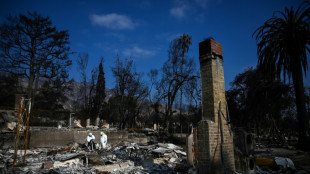
-
 EU to target US online services after Trump tariffs: France
EU to target US online services after Trump tariffs: France
-
How Trump's 'liberation day' tariffs will impact China
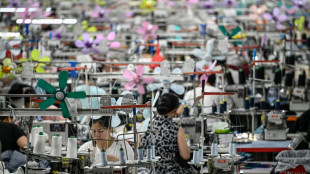
-
 Malaysia suspends search for long-missing flight MH370
Malaysia suspends search for long-missing flight MH370
-
Search for long-missing flight MH370 suspended: Malaysia minister

-
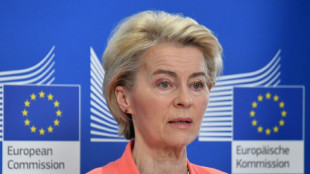 Europe hits out at Trump tariffs, keeps door open for talks
Europe hits out at Trump tariffs, keeps door open for talks
-
Myanmar's junta chief to head to Bangkok summit as quake toll surpasses 3,000
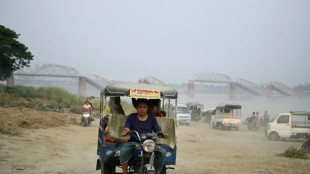
-
 Lawson vows to prove he belongs in F1 after shock of Red Bull axing
Lawson vows to prove he belongs in F1 after shock of Red Bull axing
-
Australia sweats through hottest 12 months on record: official data

-
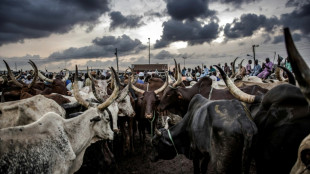 Livestock theft is central to jihadist economy in west Africa
Livestock theft is central to jihadist economy in west Africa
-
South African artist champions hyenas in 'eco-queer' quest
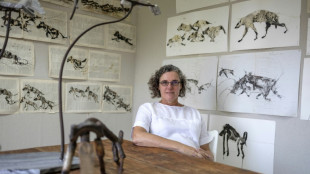
-
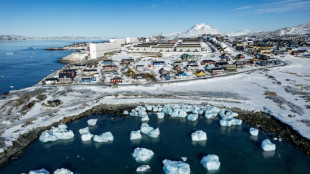 Danish PM in 'unity' Greenland visit amid US takeover threats
Danish PM in 'unity' Greenland visit amid US takeover threats
-
Taiwan says US tariffs 'highly unreasonable'
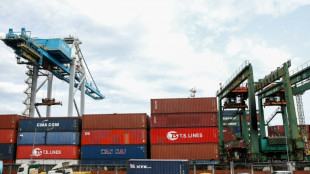
-
 Lawson says ruthless Red Bull axing was 'tough to hear'
Lawson says ruthless Red Bull axing was 'tough to hear'
-
Heat humble Celtics for sixth straight win, Thunder roll on

-
 Trump escalates trade war with sweeping global tariffs
Trump escalates trade war with sweeping global tariffs
-
Japan says US tariffs 'extremely regrettable', may break WTO rules
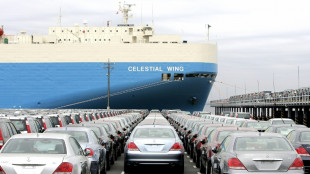
-
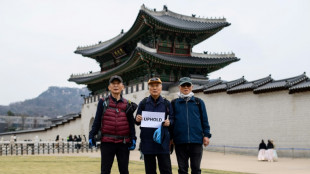 South Koreans anxious, angry as court to rule on impeached president
South Koreans anxious, angry as court to rule on impeached president
-
Juve at in-form Roma with Champions League in the balance

-
 Injuries put undermanned Bayern's title bid to the test
Injuries put undermanned Bayern's title bid to the test
-
Ovechkin scores 892nd goal -- three away from Gretzky's NHL record

-
 Australian former rugby star Petaia signs for NFL's Chargers
Australian former rugby star Petaia signs for NFL's Chargers
-
China says opposes new US tariffs, vows 'countermeasures'

-
 Athletics world watching as 'Grand Slam Track' prepares for launch
Athletics world watching as 'Grand Slam Track' prepares for launch
-
Heat humble Celtics for sixth straight win, Cavs top Knicks

-
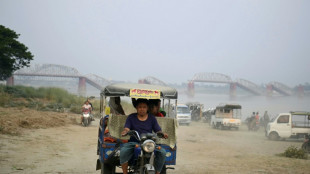 Quake-hit Myanmar's junta chief to head to Bangkok summit
Quake-hit Myanmar's junta chief to head to Bangkok summit
-
New Spielberg, Nolan films teased at CinemaCon

-
 Shaken NATO allies to meet Trump's top diplomat
Shaken NATO allies to meet Trump's top diplomat
-
Israel's Netanyahu arrives in Hungary, defying ICC warrant
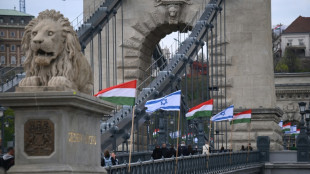
-
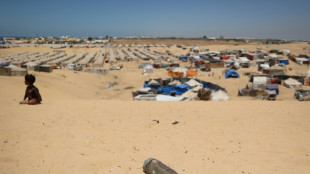 Shiny and deadly, unexploded munitions a threat to Gaza children
Shiny and deadly, unexploded munitions a threat to Gaza children
-
Stocks tank, havens rally as Trump tariffs fan trade war

-
 Altomare hangs on to tie defending champ Korda at LPGA Match Play
Altomare hangs on to tie defending champ Korda at LPGA Match Play
-
Paraguay gold rush leaves tea producers bitter

-
 Health concerns swirl as Bolivian city drowns in rubbish
Health concerns swirl as Bolivian city drowns in rubbish
-
Syria says deadly Israeli strikes a 'blatant violation'

-
 Financial markets tumble after Trump tariff announcement
Financial markets tumble after Trump tariff announcement
-
Starbucks faces new hot spill lawsuits weeks after $50mn ruling


Trees could cut urban heatwave mortality by a third: study
Planting more trees in urban areas to lower summertime temperatures could decrease deaths directly linked to hot weather and heatwaves by a third, researchers said Wednesday.
Modelling found that increasing tree cover to 30 percent would shave off 0.4 degrees Celsius (0.7 degrees Fahrenheit) locally, on average, during hot summer months, they reported in The Lancet.
Of the 6,700 premature deaths attributed to higher temperatures in 93 European cities during 2015, one third could have been prevented, according to the findings.
Currently, just under 15 percent of urban environments in Europe, on average, are covered by some kind of foliage.
The study is the first to project the number of premature deaths due to higher temperatures in cities that could be prevented by additional tree cover, said lead author Tamar Iungman, a researcher at the Barcelona Institute for Global Health.
"We already know that high temperatures in urban environments are associated with negative health outcomes, such as cardiorespiratory failure, hospital admission, and premature death," he said in a statement.
"Our goal is to inform local policy and decision-makers about the benefits of strategically integrating green infrastructure into urban planning in order to promote more sustainable, resilient and healthy urban environments."
Cities record higher temperatures than surrounding suburbs or countryside due to the so-called urban heat island effect.
This extra heat is caused primarily by a lack of vegetation, exhaust from air conditioning systems, along with dark-hued asphalt and building materials that absorb and trap warmth.
Climate change has already amplified the problem. Last year, Europe saw its hottest summer on record, and second warmest year.
- Health benefits -
Heatwaves around the world are seeing record-breaking peaks, and have increased in duration in recent decades.
Today, cold conditions still cause more deaths in Europe than hot weather. But climate models project that heat-related illness and death will present a bigger burden to health services within a decade.
"This is becoming increasingly urgent as Europe experiences more extreme temperature fluctuations caused by climate change," said Iungman.
The researchers estimated mortality rates for people over 20 years old between June and August 2015, accounting for 57 million inhabitants in total.
This data was analysed in relation to daily average city temperatures in two modelling scenarios.
The first compared the city temperature with and without urban heat islands. The second simulating temperature reduction if tree cover was increased to 30 percent.
On average, the temperature in cities was 1.5C warmer during summer 2015 than in the surrounding countryside. The city with the highest difference -- 4.1C -- was Cluj-Napoca, Romania.
Across all cities, 75 percent of the total population lived in areas at least one degree warmer, while 20 percent experienced temperatures at least two degrees higher.
Overall, cities with highest temperature-elated mortality rates were in southern and eastern Europe.
"This is an important piece of research," commented Laurence Wainwright, a lecturer at the University of Oxford's Smith School of Enterprise and the Environment.
"Urban tree planting -– on the right scale, in the right places, and under certain other conditions -– likely leads to a modest-yet-real reduction in heat-related deaths in many urban areas."
Earlier studies have shown that green spaces can have additional health benefits such as reducing cardiovascular disease, dementia and poor mental health, as well as improving cognitive functioning of children and the elderly.
F.Dubois--AMWN



